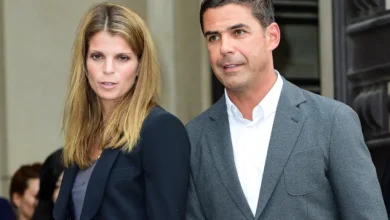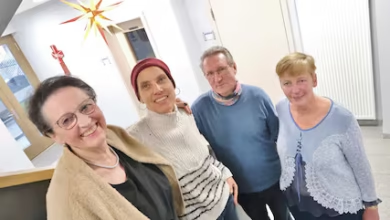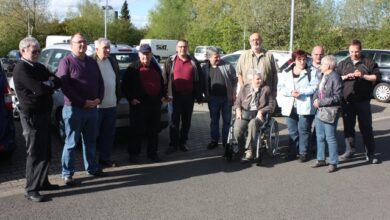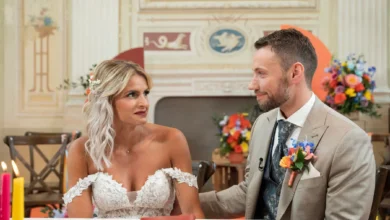
Unveiling the Enigma Wolfgang Feindt Todesursache
In the bustling world of German television, few names spark as much curiosity and admiration as Wolfgang Feindt. But when whispers turned to shock on September 27, 2024, the question on everyone’s lips became Wolfgang Feindt Todesursache—the cause behind the untimely passing of this visionary producer. At just 60 years young, Feindt left behind a legacy that’s not just a footnote in TV history, but a beacon lighting up screens across Europe and beyond. Sure, the details of his departure remain a private veil, draped in the respect his family and colleagues hold dear. Yet, here’s the silver lining: his story isn’t one of endings, but of beginnings that continue to inspire storytellers everywhere. Let’s dive into the life of a man whose passion for gripping narratives turned ordinary evenings into edge-of-your-seat adventures, reminding us that true impact echoes long after the credits roll.
Feindt wasn’t one to chase the spotlight; he was the guy behind the scenes, crafting the magic that hooked millions. Born in the vibrant city of Mönchengladbach on May 10, 1964, he grew up in an era when television was evolving from black-and-white broadcasts to colorful sagas that mirrored our wildest dreams and deepest fears. As we explore his journey, we’ll peel back the layers—not to speculate wildly on Wolfgang Feindt Todesursache, but to celebrate how his life’s work offers hope, creativity, and a nudge to keep dreaming big. After all, in the grand script of life, it’s the characters like Feindt who make the plot unforgettable.

Wolfgang Feindt – Movies, Bio and Lists on MUBI
A Youth Steeped in Stories: Feindt’s Formative Years
Picture this: a young lad in post-war Germany, surrounded by the hum of reconstruction and the flicker of early TV sets. Wolfgang Feindt’s early life was anything but ordinary—think of it as the opening act of a thriller, full of quiet determination and a spark that would one day ignite international hits. Growing up in Mönchengladbach, a town known for its football fervor and industrial grit, Feindt found solace in the pages of books and the glow of theater stages. His parents, though not in the limelight themselves, instilled a love for storytelling that felt as natural as breathing.
By his teens, Feindt was already dabbling in amateur dramatics, those backyard plays where kids turn cardboard boxes into castles. It wasn’t long before he set his sights higher. Enrolling at Justus-Liebig-Universität Gießen, he pursued a degree in Theaterwissenschaft—the science of theater, if you will—which sharpened his eye for narrative arcs and character depth. “Theater isn’t just entertainment,” he once quipped in an interview, “it’s a mirror to our souls, reflecting back the chaos and beauty of being human.” Graduating with honors, Feindt didn’t stop there. He jetted off to Hamburg’s Hochschule für Musik und Theater, diving headfirst into Kulturmanagement. This blend of arts and business? It was like handing a poet a ledger—practical yet profoundly creative.
Those student days weren’t all lectures and late nights, mind you. Feindt volunteered at local festivals, coordinating events that drew crowds from across the Rhine. One standout memory? Organizing a street theater production on urban myths that had passersby gasping and applauding well into the dusk. Little did he know, these humble gigs were rehearsals for the grand stage of ZDF. As we reflect on Wolfgang Feindt Todesursache, it’s heartening to see how these roots nourished a career blooming with optimism, proving that even in loss, the seeds of inspiration keep sprouting.
Stepping into the Spotlight: Feindt’s Broadcast Breakthrough
Fast-forward to 1996, and Wolfgang Feindt trades campus coffee for the high-stakes world of public broadcasting. Landing a role at ZDF, Germany’s second-largest public TV network, felt like hitting the jackpot—except instead of cash, he scored creative freedom. Starting as a junior editor in the fiction department, Feindt quickly climbed the ranks, his knack for spotting talent as sharp as a director’s cut. “I always say, television is a team sport,” he’d chuckle, crediting his early mentors for teaching him the ropes.
His first big break? Overseeing a slate of domestic dramas that captured the everyday heroism of ordinary folks. But Feindt had grander visions—why stick to local tales when the world was brimming with stories begging to cross borders? By the early 2000s, he was spearheading international co-productions, bridging gaps between German precision and Scandinavian suspense. It was during this phase that Feindt’s optimism shone brightest; he believed TV could unite cultures, one shared plot twist at a time. And boy, did he deliver. As tributes pour in post his passing, it’s clear his breakthrough wasn’t just professional—it was a lifeline for diverse voices in a sometimes echo-chamber industry.
Crafting Masterpieces: Iconic Projects Under Feindt’s Wing
Ah, the meaty part—Feindt’s portfolio reads like a binge-watcher’s dream. As commissioning editor and executive producer, he greenlit projects that didn’t just entertain; they provoked, healed, and yes, even healed a bit of the world’s cynicism. Take the Millennium trilogy adaptations, for starters. Based on Stieg Larsson’s pulse-pounding novels, Feindt’s team brought The Girl with the Dragon Tattoo and its sequels to ZDF screens in 2009-2010. Noomi Rapace’s fierce Lisbeth Salander? That was Feindt’s bet on bold female leads, paying off with International Emmy nods and a fanbase that still geeks out over hacker heroines.
Then there’s Kommissarin Lund – Das Verbrechen, the German take on Denmark’s The Killing. Feindt’s touch? Infusing it with Rhine Valley realism, making viewers feel the chill of Copenhagen fog right in their living rooms. “We don’t make TV for awards,” he’d say with a wink, “but for those ‘aha!’ moments that stick with you.” And stick they did—series like Vienna Blood, a Sherlockian spin set in fin-de-siècle Austria, earned rave reviews for blending history with heart-pounding mystery.
But Feindt’s genius lay in variety. He championed lighter fare too, like the Marie Brand series, where detective Marie solves crimes with wit sharper than her heels. From 2022’s Marie Brand und die falsche Wahrheit to upcoming 2025 episodes, Feindt ensured these tales balanced grit with grace. Bullet-pointing his hits:
- Millennium Series (2009-2010): Thriller gold, executive produced for global appeal.
- Department Q: The Absent One (2014): Danish noir with a German polish, showcasing Feindt’s cross-border savvy.
- The Sommerdahl Murders (2022-2024): Co-produced beachside whodunits that proved summer slays could be smart fun.
- Landkrimi Series (2021-2023): Rural mysteries highlighting Germany’s hidden gems, from snowy slopes to verdant valleys.
Each one a testament to Feindt’s eye for what makes us tick—and laugh, cry, or gasp in unison.
Global Bridges: Feindt’s International Co-Productions
If Feindt’s domestic work was the hearty hausfrau stew, his international ventures were the exotic spices that elevated it to gourmet status. Partnering with ORF in Austria and broadcasters from Sweden to the UK, he turned ZDF into a hub for hybrid hits. Vienna Blood, for instance, wasn’t just a co-pro with Endor Productions; it was a cultural mash-up, weaving Freudian psychology into imperial intrigue. Feindt’s role? The diplomatic producer, smoothing egos and syncing visions across time zones.
One standout collaboration: the 2022 revival of Inspector and the Sea, blending British cozies with German depth. “Borders are for maps, not stories,” Feindt once mused, and he lived it. His efforts snagged deals with Beta Film and Red Arrow, expanding ZDF’s footprint while importing fresh winds into stale genres. Optimism dripped from every pitch meeting—Feindt saw co-pros not as risks, but as rocket fuel for creativity. In an industry often bogged by budgets, his forward-thinking forged alliances that outlast contracts, a legacy that whispers hope even amid Wolfgang Feindt Todesursache queries.
Sub-headings here unpack the magic:
Navigating Cultural Nuances
Feindt mastered the art of adaptation, tweaking Scandinavian chill for warmer German hearts without losing edge.
Award-Winning Alliances
From Emmys to Grimme Prizes, his projects racked up hardware, proving collaboration breeds champions.
Future-Proofing TV
Even in 2024, Feindt’s slate—like Weiss & Morales—promised diverse duos tackling tomorrow’s tales.
The Quiet Storm: Health, Privacy, and Wolfgang Feindt Todesursache
Now, to the heart-tugger: Wolfgang Feindt Todesursache. On that crisp autumn day in 2024, news broke of Feindt’s passing at 60, leaving fans and peers reeling. Buried at Cologne’s Melaten Cemetery, his send-off was intimate, a nod to the man who preferred subtext over spotlights. But here’s the rub—and the ray of light—the exact cause hasn’t been shared publicly. Was it a sudden health hiccup, a battle fought in silence? Speculation swirls like fog over the Rhine, but Feindt’s circle honors his privacy, a choice that’s refreshingly human in our tell-all times.
Think about it: in a world obsessed with oversharing, Feindt’s discretion teaches us grace. Colleagues hint at his vitality right up to the end—zipping between sets, brainstorming over coffee. No dramatic farewell tour; just a life well-lived, cut short yet brimming with unfulfilled scripts. Optimistically, this mystery invites us to focus on the joy he sparked, not the shadow of loss. After all, as Feindt might say, “The best stories leave you wanting more”—and his does, urging us to cherish every frame.
Echoes of Admiration: Tributes Pouring In
When word spread, the airwaves lit up with love. Beta Film’s LinkedIn post? A tear-jerker, recalling “countless meetings over steins of beer and blueprints of brilliance.” ZDF aired a special montage, clips from Marie Brand intercut with Feindt’s rare on-camera quips. Peers like director Thomas Roth called him “the unsung hero, turning ‘what if’ into ‘wow.'”
Bullet points of heartfelt nods:
- Industry Icons: Micha Terjung, producer extraordinaire, lauded Feindt’s “instinct for the indelible.”
- Fan Forums: Reddit threads buzzed with “RIP to the man who made Mondays must-watch.”
- Obituary Waves: SZ-Gedenken.de’s page drew thousands, each candle a collective sigh of gratitude.
These tributes? They’re Feindt’s encore, proving one person’s passion ripples outward, turning sorrow into shared celebration.
Enduring Footprints: Feindt’s Stamp on German TV
Zoom out, and Wolfgang Feindt’s influence is etched in ZDF’s DNA. He championed “light crime”—mysteries minus the gore, perfect for family viewing. Series like Landkrimi spotlighted rural tales, countering urban bias with verdant vistas and village villains. His push for female-led narratives? Ahead of the curve, empowering stars from Rapace to Mariele Millowitsch.
A quick table of his impact:
| Category | Key Contribution | Example Project | Lasting Effect |
|---|---|---|---|
| Crime Thrillers | Blending Nordic noir with local flavor | Millennium Trilogy | Boosted ZDF’s international sales |
| Cozy Mysteries | Emphasizing wit over violence | Marie Brand Series | Inspired a wave of feel-good felonies |
| Historical Dramas | Fusing fact and fiction seamlessly | Vienna Blood | Revived interest in period pieces |
| Rural Narratives | Highlighting Germany’s heartland stories | Landkrimi | Diversified TV’s urban skew |
Feindt’s ethos? “TV should uplift, not underwhelm.” His footprints guide new editors, a optimistic blueprint for storytelling that heals divides.
Personal Glimpses: The Man Beyond the Memo
Behind the memos was a Feindt who loved a good hike, camera in hand, capturing Rhine sunsets for “inspiration fuel.” Friends recall his dry humor—”If life’s a script, mine’s got too many plot holes”—and his generosity, mentoring juniors over impromptu barbecues. Married? Details stay close to the vest, but whispers of a supportive partner paint him as devoted off-screen too.
In interviews, he’d detour to passions: jazz records spinning late, or debating Dostoevsky over dinner. This multifaceted man reminds us: creators aren’t islands; they’re woven into life’s rich tapestry. As we ponder Wolfgang Feindt Todesursache, these glimpses affirm his wholeness—a life of quiet joys amplifying his loud legacy.
Charting New Horizons: Feindt’s Vision for Tomorrow’s TV
Even in repose, Feindt’s ideas propel forward. His final commissions, like 2025’s Kabul—a tale of resilience amid chaos—embody his belief in stories as salves. He foresaw streaming’s rise, advocating hybrid models where ZDF shines globally. “The future’s collaborative,” he’d insist, eyeing AI tools not as threats, but sidekicks for sharper scripts.
Subtly, Feindt nudged inclusivity: more LGBTQ+ arcs, diverse casts reflecting real Germany. His optimism? Infectious, urging peers to “bet on the underdog narrative.” Today, as networks grapple with change, Feindt’s horizon-gazing feels prophetic—a hopeful hand extended from the past.
Reflections and Ripples: How Feindt Inspired Us All
Peeling back Wolfgang Feindt Todesursache layers reveals not voids, but vibrant echoes. Aspiring producers cite his masterclasses; viewers rewatch favorites with fresh gratitude. In Berlin cafes, filmmakers toast “to Wolfgang, the bridge-builder.” His story? A masterclass in resilience, showing how one soul’s spark can illuminate countless paths.
From Mönchengladbach boy to ZDF titan, Feindt wove optimism into every edit. Sure, questions linger, but that’s life’s plot twist—inviting us to write continuations filled with his spirit.
FAQS
What Made Wolfgang Feindt Stand Out in TV Production?
Feindt’s magic was his blend of gut instinct and global savvy, turning co-pros into cultural crossovers that felt effortlessly universal.
How Did Feindt Influence International Storytelling?
By fostering Nordic-German hybrids, he proved borders blur when tales transcend them, earning Emmys and endless replays.
Are There Upcoming Projects Tied to Feindt’s Vision?
Yes! 2025 releases like Marie Brand und die Sünden der anderen carry his commissioning torch, promising more twists with heart.
Why Is Wolfgang Feindt Todesursache Kept Private?
In a nod to dignity, his loved ones shield details, focusing tributes on life’s highlights—a choice that honors his understated style.
What’s the Best Way to Honor Feindt’s Legacy?
Dive into his projects—stream Vienna Blood or Millennium—and let the stories stir your own creative fires.
Fazit
Wrapping up our journey through Wolfgang Feindt’s world, Wolfgang Feindt Todesursache emerges less as a shadow and more as a gentle pause in an ongoing saga. At 60, he bowed out too soon, yet his optimism— that unshakeable belief in stories’ power to connect and console—lingers like a favorite rerun. From gritty thrillers to cozy crimes, Feindt didn’t just produce TV; he produced possibility, reminding us that even in uncertainty, creativity’s light never dims. So here’s to you, Wolfgang: may your narratives keep us company, turning every “what if” into “watch this.” In the end, it’s not the finale that counts, but the applause that follows—and yours? It’s thunderous, eternal.



